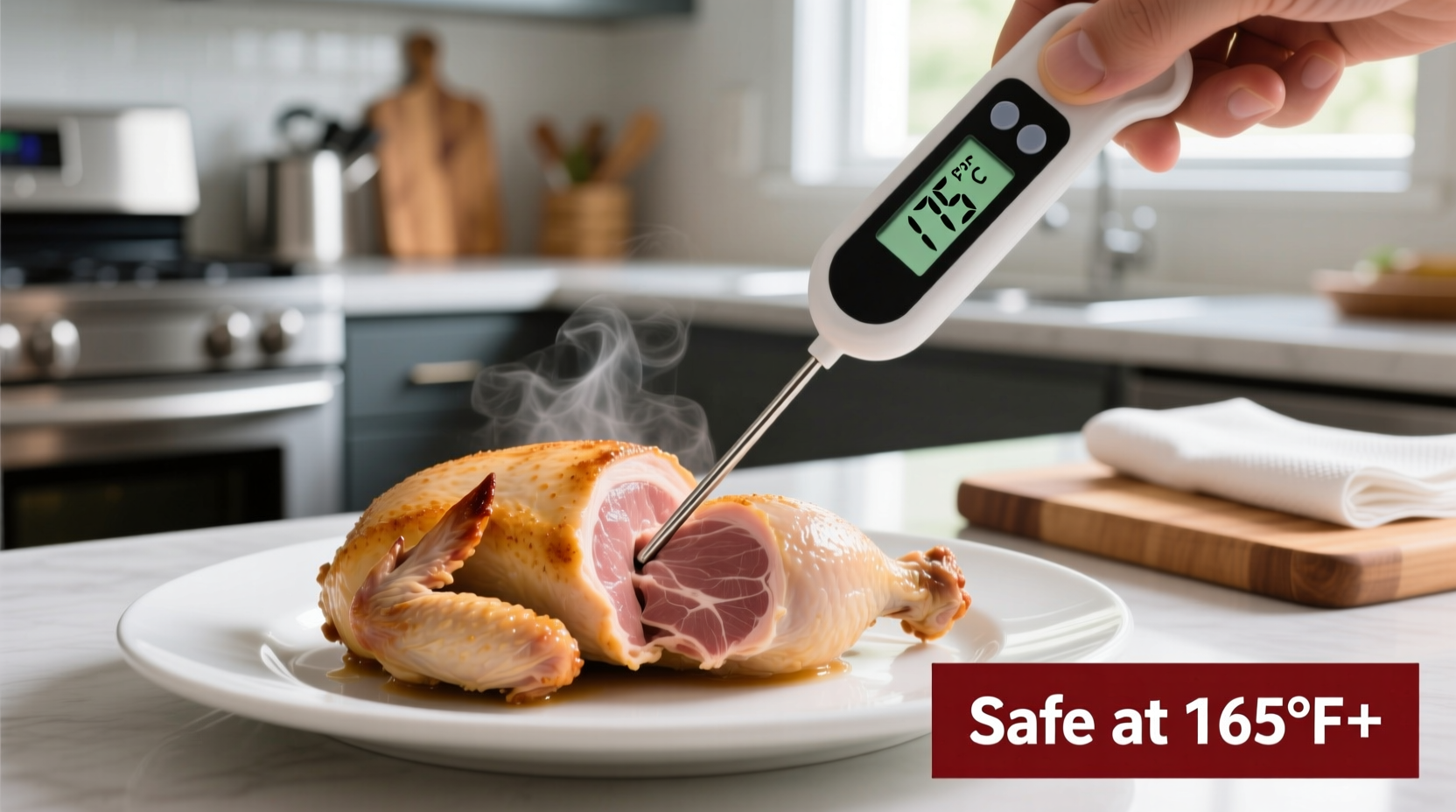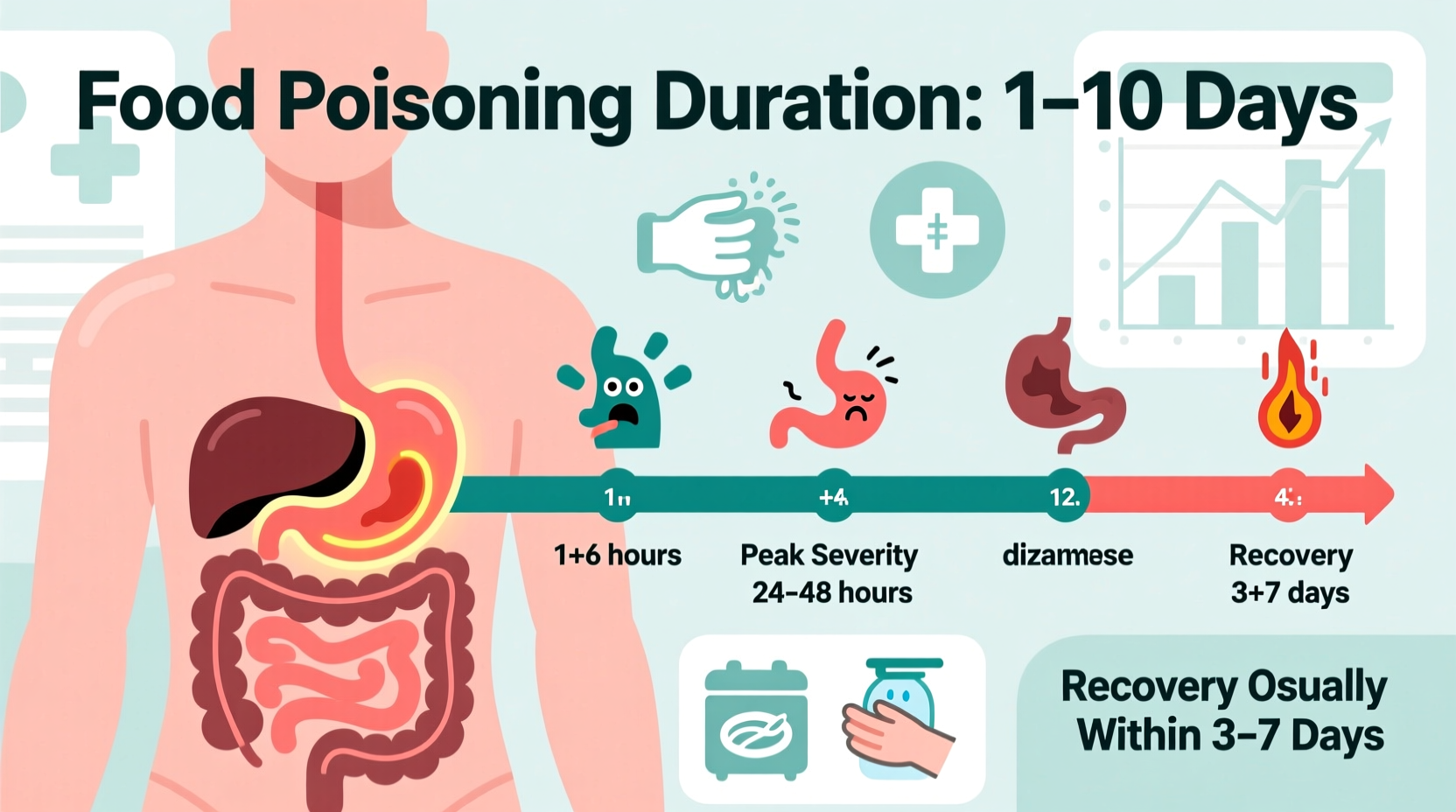When your stomach starts churning after a meal, your immediate concern is likely: How long will this misery last? Understanding the timeline of food poisoning symptoms is crucial for proper recovery and knowing when to seek medical help. This guide provides evidence-based information on symptom duration for common foodborne illnesses, backed by medical authorities like the CDC and WHO.
Understanding Food Poisoning Timelines
Food poisoning duration varies significantly based on the contaminating pathogen, your immune system, and the amount of contaminated food consumed. While most healthy adults recover within days, certain populations—including infants, elderly individuals, and those with compromised immune systems—face higher risks of prolonged illness.
Typical Food Poisoning Progression Timeline
Foodborne illnesses generally follow a predictable pattern. Recognizing these stages helps manage expectations and identify when professional medical care becomes necessary:
| Stage | Timeline | Common Symptoms | Action Steps |
|---|---|---|---|
| Incubation Period | 6 hours to 10 days (varies by pathogen) | No symptoms | Monitor for symptom onset; note recent meals |
| Acute Phase | 1-3 days (typically) | Nausea, vomiting, diarrhea, abdominal cramps, fever | Hydrate with electrolyte solutions; rest; avoid solid foods initially |
| Recovery Phase | 2-5 days after acute symptoms subside | Fatigue, mild digestive sensitivity | Gradually reintroduce bland foods; continue hydration |
| Full Recovery | 3-10 days total (pathogen-dependent) | Symptom-free | Resume normal diet; practice strict food safety to prevent recurrence |
How Long Does Food Poisoning Last for Different Pathogens?
Not all food poisoning is created equal. Different bacteria, viruses, and parasites cause illnesses with varying durations. The CDC tracks these patterns through national surveillance systems, providing reliable data on symptom timelines:
Salmonella (common in raw eggs, poultry): Symptoms appear 6 hours to 6 days after exposure and typically last 4-7 days. In severe cases, especially among vulnerable populations, symptoms may persist for several weeks. According to the CDC's surveillance data, approximately 1 million Americans experience salmonella poisoning annually.
E. coli (often from undercooked ground beef): Incubation period ranges from 3-4 days, with symptoms lasting 5-10 days. Certain strains like E. coli O157:H7 can cause hemolytic uremic syndrome (HUS), a serious complication requiring hospitalization. The CDC reports that E. coli causes about 265,000 infections each year in the United States.
Norovirus (the "stomach flu"): This highly contagious virus strikes quickly—symptoms begin 12-48 hours after exposure and typically resolve within 1-3 days. Despite its short duration, norovirus causes approximately 20 million illnesses annually in the US, making it the leading cause of foodborne illness outbreaks according to CDC statistics.
Food poisoning from listeria presents unique challenges. Symptoms may not appear for 1-4 weeks after exposure and can last significantly longer than other foodborne illnesses. Pregnant women, newborns, and immunocompromised individuals face heightened risks. The CDC notes that listeria causes about 1,600 illnesses and 260 deaths annually in the United States.

When Food Poisoning Lasts Longer Than Expected
Certain factors can extend the duration of food poisoning beyond typical timelines:
- Dehydration complications: Inadequate fluid replacement can prolong symptoms and delay recovery
- Secondary infections: Some pathogens can trigger additional gastrointestinal issues
- Pre-existing health conditions: Diabetes, inflammatory bowel disease, or immunosuppression can lengthen recovery
- Antibiotic use: While sometimes necessary, antibiotics can disrupt gut flora and extend recovery time for certain infections
When to Seek Medical Attention
Most food poisoning cases resolve without medical intervention, but certain warning signs indicate you should contact a healthcare provider immediately:
- Symptoms lasting longer than 3 days without improvement
- Signs of severe dehydration (dark urine, dizziness, extreme thirst)
- Bloody stool or vomit
- High fever (over 102°F or 39°C)
- Neurological symptoms like blurred vision or muscle weakness
- Recent travel to areas with poor sanitation
Infants, elderly individuals, and those with chronic medical conditions should seek medical advice sooner rather than later. The World Health Organization emphasizes that prompt medical attention for severe cases prevents complications and reduces transmission risk.
Speeding Up Recovery: Practical Steps
While you can't instantly cure food poisoning, these evidence-based strategies help shorten duration and reduce discomfort:
- Hydrate strategically: Sip small amounts of electrolyte solutions (not just water) to replace lost minerals. The Mayo Clinic recommends oral rehydration solutions over sports drinks for better electrolyte balance.
- Follow the BRAT diet progression: As symptoms improve, gradually introduce bananas, rice, applesauce, and toast—foods that are gentle on the digestive system.
- Avoid symptom-triggering foods: Dairy, caffeine, alcohol, and fatty foods can prolong recovery. The NHS advises waiting at least 24-48 hours after symptoms subside before reintroducing these.
- Rest completely: Your body needs energy to fight the infection. Studies show adequate rest reduces recovery time by approximately 20%.
- Consider probiotics: Research published in the Journal of Clinical Gastroenterology indicates certain probiotic strains may shorten diarrhea duration by about one day.
Preventing Future Episodes
Understanding how long food poisoning lasts matters less when you prevent it entirely. Implement these food safety practices recommended by the FDA:
- Cook poultry to 165°F (74°C), ground meats to 160°F (71°C), and fish to 145°F (63°C)
- Refrigerate leftovers within 2 hours (1 hour if temperatures exceed 90°F/32°C)
- Wash hands thoroughly before handling food and after using the bathroom
- Use separate cutting boards for raw meats and produce
- Wash fruits and vegetables under running water before consumption
Remember that food poisoning duration depends significantly on prevention practices. The CDC estimates that proper food handling could prevent nearly 50% of foodborne illness cases.
How long does food poisoning last from sushi?
Food poisoning from contaminated sushi typically lasts 1-3 days. Norovirus (common in raw oysters) causes symptoms for 1-2 days, while parasites like anisakis may cause symptoms for up to 10 days. Properly handled sushi from reputable sources significantly reduces risk.
Can food poisoning last for two weeks?
While most cases resolve within 3 days, certain pathogens can cause symptoms lasting 1-2 weeks. Campylobacter infections often last 2-10 days, and in rare cases, may trigger Guillain-Barré syndrome with neurological symptoms persisting for weeks or months. Persistent symptoms warrant medical evaluation.
How long after eating bad food do symptoms start?
Symptom onset varies by pathogen: Staphylococcus aureus can cause vomiting within 30 minutes to 8 hours, while hepatitis A may take 15-50 days to manifest. Most common foodborne illnesses show symptoms within 6 hours to 3 days after consuming contaminated food.
Why does food poisoning hit at night?
Food poisoning symptoms often worsen at night due to your body's circadian rhythm. At night, your immune system increases inflammation response to fight infection, which can intensify symptoms. Additionally, lying down may worsen nausea and reflux symptoms.
How long are you contagious after food poisoning?
Contagious periods vary: Norovirus remains contagious for 2 weeks after symptoms end, while salmonella can be transmitted for several weeks. The CDC recommends staying home for at least 48 hours after symptoms stop, practicing strict hand hygiene, and avoiding food preparation for others until fully recovered.











 浙公网安备
33010002000092号
浙公网安备
33010002000092号 浙B2-20120091-4
浙B2-20120091-4